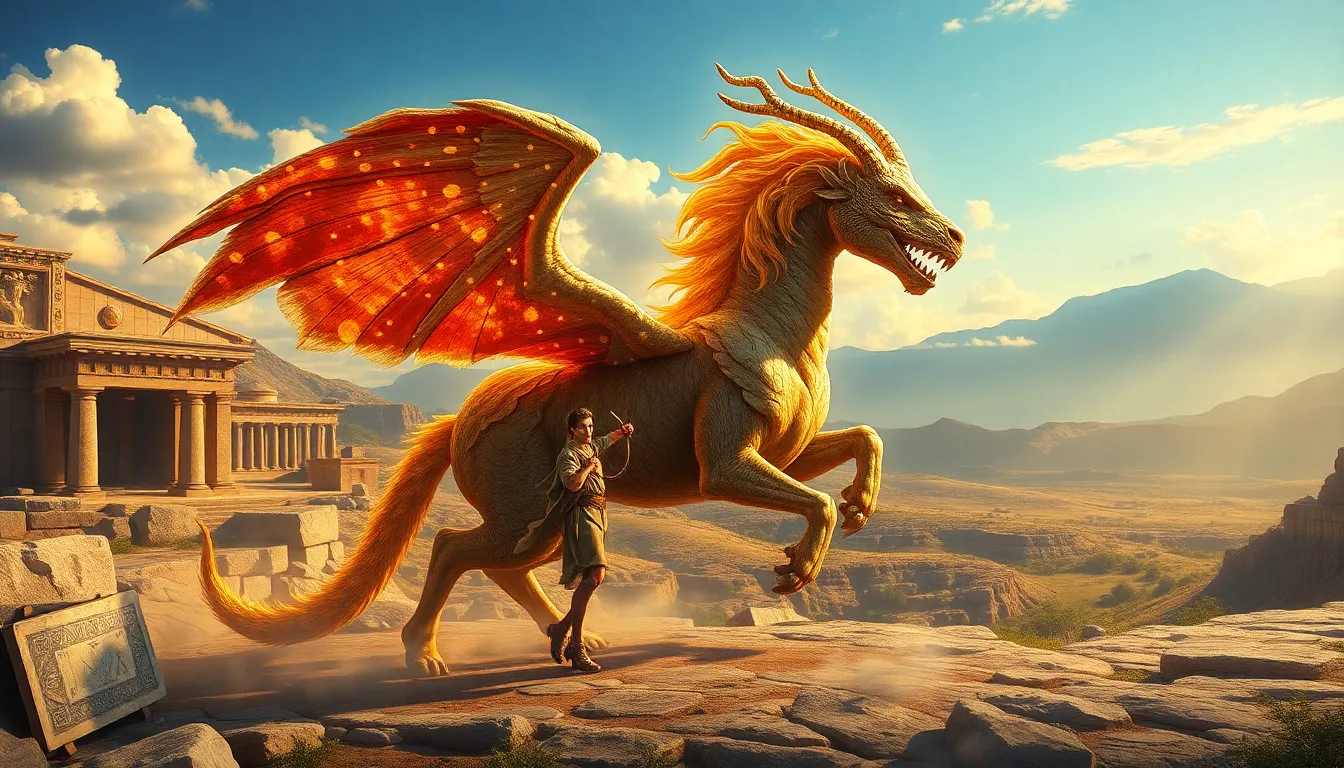Bellerophon and the Chimera: A Hero’s Journey in Greek Mythology
I. Introduction to Greek Mythology
Greek mythology is a rich tapestry of stories that have shaped Western literature and culture. It serves as a lens through which we can explore human nature, morality, and the divine, showcasing the ancient Greeks’ understanding of their world. Myths often feature heroes who embody ideals such as bravery, honor, and resilience, making them timeless figures in storytelling.
Among these heroic tales, the legend of Bellerophon stands out, particularly his encounter with the fearsome Chimera. This story not only highlights the qualities of a hero but also delves into themes of ambition, divine intervention, and the consequences of pride.
II. The Origins of Bellerophon
Bellerophon was born to the mortal king Glaucus of Corinth and the princess Eurynome. His early life was marked by hardship, as he was accused of a crime he did not commit, leading him to flee to Lycia. His divine lineage, being a descendant of the gods, foreshadowed his extraordinary destiny.
Upon reaching Lycia, Bellerophon faced numerous challenges, including proving his worthiness to King Iobates. His initial quests were not merely tests of strength but also deeply intertwined with themes of loyalty and justice, setting the stage for his legendary encounters.
III. The Legend of the Chimera
The Chimera is often depicted as a monstrous creature, part lion, part goat, and part serpent, breathing fire and terrorizing the land of Lycia. Its terrifying presence represents chaos and destruction, challenging the very fabric of civilization.
Historically, the Chimera’s significance in mythology is profound. It embodies the fears of the unknown and the struggle against insurmountable odds. As a creature of hybrid nature, it symbolizes the complexities of life and the battles heroes must face in their quests for glory.
IV. The Role of Pegasus
Central to Bellerophon’s journey is the winged horse, Pegasus, which he acquires with the help of the goddess Athena. The acquisition of Pegasus marks a turning point in Bellerophon’s adventures, as it grants him the ability to soar above his challenges.
Pegasus is not just a mode of transport; he represents inspiration and the pursuit of lofty ideals. In Greek mythology, Pegasus symbolizes the connection between the earthly and the divine, and his presence elevates Bellerophon’s heroism to new heights.
V. The Quest to Defeat the Chimera
Bellerophon prepared meticulously for the battle against the Chimera. Armed with the guidance of the gods, along with his trusty steed Pegasus, he devised a strategy that showcased his bravery and intellect. His preparation included:
- Gathering necessary weapons, including a spear and armor.
- Studying the Chimera’s behavior to understand its weaknesses.
- Practicing aerial maneuvers on Pegasus to gain a tactical advantage.
The confrontation with the Chimera was dramatic, filled with a mix of fear and determination. Bellerophon flew above the creature, using his agility and strength to strike at the beast from the air. His tactics involved:
- Aerial attacks to avoid the Chimera’s fiery breath.
- Using the spear to pierce the creature’s vulnerable spots.
- Employing swift maneuvers to evade the Chimera’s counterattacks.
This battle not only tested Bellerophon’s skills but also showcased the heroic qualities that defined him: courage, quick thinking, and the ability to rise to the occasion.
VI. The Aftermath of the Victory
Upon slaying the Chimera, Bellerophon achieved fame and recognition, transforming from an outcast to a celebrated hero. His victory brought peace to Lycia, and the people hailed him as their savior. The aftermath of his triumph included:
- Receiving honors and rewards from King Iobates.
- Establishing himself as a formidable warrior whose tales spread across Greece.
- Building alliances that would enhance his power and influence.
The defeat of the Chimera also symbolized the triumph of order over chaos, as Bellerophon restored stability to a land plagued by fear.
VII. The Downfall of Bellerophon
Despite his monumental success, Bellerophon’s story takes a tragic turn. His hubris grows as he attempts to fly to Mount Olympus, seeking to join the gods. This ambition leads to his downfall, as the gods, particularly Zeus, punish him for his arrogance.
The role of the gods in Bellerophon’s fate is crucial. They serve as a reminder of the limits of human ambition and the importance of humility. His fall from grace teaches valuable lessons about:
- The dangers of pride and overreaching.
- The necessity of respecting divine boundaries.
- The fleeting nature of fame and fortune.
VIII. Conclusion: The Legacy of Bellerophon and the Chimera
The tale of Bellerophon and the Chimera reflects enduring themes of heroism and hubris. It serves as a cautionary tale about the balance between ambition and humility. Bellerophon’s journey from a hero to a cautionary figure illustrates the complexities of human nature and the consequences of our actions.
In modern culture, Bellerophon’s story continues to resonate, influencing literature, art, and film. The character of Bellerophon embodies the archetypal hero, while the Chimera remains a powerful symbol of the challenges we face in our quest for greatness.
Ultimately, the legacy of Bellerophon and the Chimera lives on in our collective consciousness, reminding us of the rich narratives that Greek mythology has to offer and their relevance in understanding the human experience.




